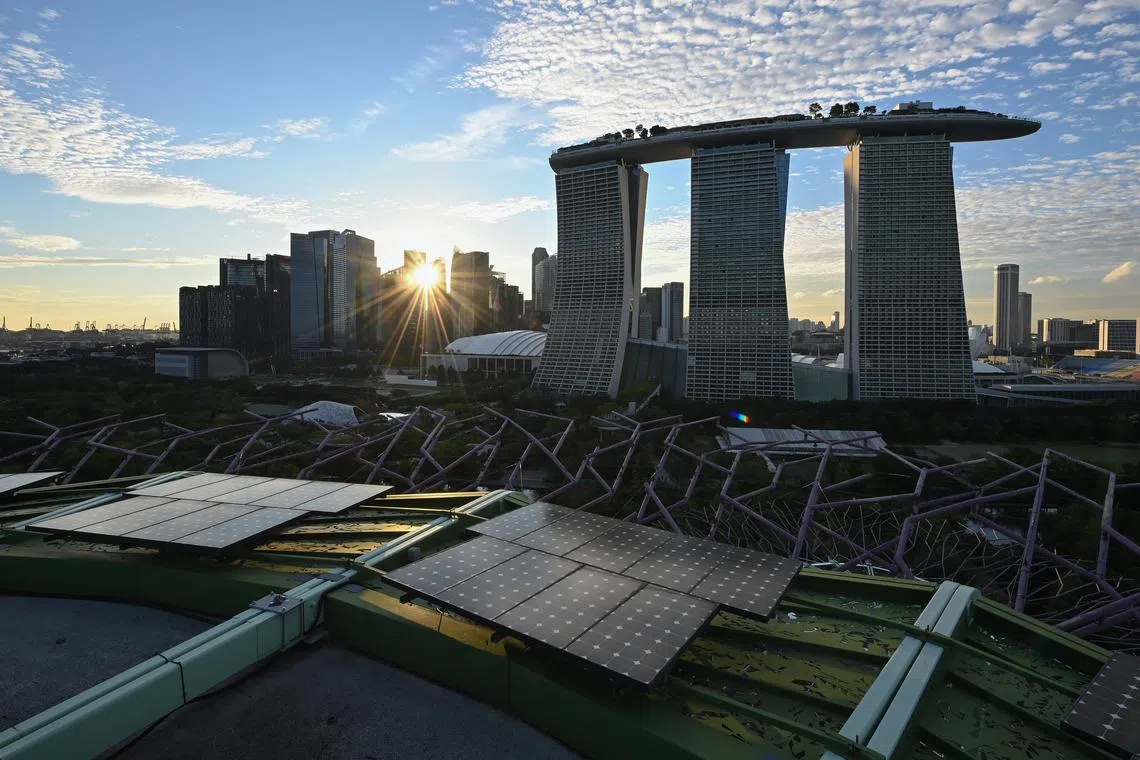List of eligible international carbon credits for tax offsets in S’pore to be released in 2023
Sign up now: Get ST's newsletters delivered to your inbox

Singapore’s carbon tax applies to all facilities producing 25,000 tonnes or more of greenhouse gas emissions in a year.
PHOTO: ST FILE
Follow topic:
SINGAPORE – A list of acceptable international carbon credits that are eligible to offset Singapore companies’ taxable carbon emissions will be published later this year, said Minister for Sustainability and the Environment Grace Fu in Parliament on Tuesday.
This comes after a controversy surrounding the legitimacy of carbon credits issued by Verra – an organisation known for developing standards to ensure the carbon offsets that it certifies has truly resulted in a reduction in greenhouse gases in the atmosphere.
The list will include eligible host countries, carbon-crediting programmes and methodologies, said Ms Fu in assuring the House that Singapore scrutinises carbon markets and projects seriously to ensure that carbon credits uphold high environmental integrity standards.
She was responding to questions from Mr Louis Chua (Sengkang GRC) on Gold Standard and Verra – firms with which the National Environment Agency (NEA) has signed memorandums of understanding (MOU).
The MOUs would pave the way for Singapore companies to use Gold Standard and Verra international carbon credits to offset their taxable emissions – subject to the credits meeting the Government’s criteria.
Gold Standard, like Verra, certifies that carbon credits bring about reductions in greenhouse gas emissions.
In 2022, it was announced that Singapore-based companies would be allowed to buy high-quality international carbon credits to offset up to 5 per cent
Singapore’s carbon tax, introduced in 2019, applies to all facilities producing 25,000 tonnes or more of greenhouse gas emissions in a year.
However, an article by The Guardian in January found that only a handful of rainforest projects certified by Verra showed a reduction in deforestation, with over 94 per cent of the projects bringing no benefit to the climate.
For example, if an organisation conserves a rainforest and estimates that its project will prevent, say, 100 hectares of deforestation, it can then use a Verra-certified formula to convert the averted deforestation into saved carbon emissions.
The saved emissions can then be purchased by a company – in the form of carbon credits – to be applied to its own carbon-reduction targets.
The Guardian reported that Verra approved three-quarters of all voluntary carbon offsets, and its rainforest protection programme made up 40 per cent of the credits it approved.
Verra questioned the methodologies used by the scientists quoted in Guardian’s investigation and the conclusions it had reached.
“The Singapore Government is aware of The Guardian’s report on rainforest credits issued by Verra, and the response and clarification issued by Verra,” said Ms Fu.
“We take all scrutiny of carbon markets and projects seriously and are committed to ensuring that carbon credits uphold high environmental integrity standards.
“We will take these developments into account as we finalise the environmental integrity criteria for the international carbon credits that are eligible for carbon tax offset.”
Commenting on the MOUs, Ms Fu noted that they are “not legally binding” and reiterated that the MOUs do not qualify all international carbon credits issued by Gold Standard and Verra.
“Companies must meet the environmental integrity criteria of the Government,” she added.
Ms Fu said that Gold Standard and Verra were selected as MOU partners as they are two of the largest carbon-crediting programmes accepted by the International Civil Aviation Organisation (ICAO) to issue carbon credits for compliance under the Carbon Offsetting and Reduction Scheme for International Aviation (Corsia).
Corsia was launched in 2016 and came into effect in 2021 to lower the aviation sector’s impact on climate change. Aircraft operators who take part in the programme have to purchase carbon credits from the carbon market to offset their emissions.
Corsia is voluntary for all countries until 2027, when participation would be compulsory for most countries.
Corsia standards have been developed and backed by a multilateral process led by ICAO, in consultation with green groups and experts, and are widely regarded as being among the most rigorous standards in the industry, said Ms Fu.
Mr Chua then asked how the Government would ensure that companies purchase only verified and “legitimate” credits.
In response, Ms Fu said the different companies have different motivations for going into carbon credits, and while the Government should not stipulate how they should offset their emissions, reputable companies could monitor what the Government is doing and follow its white list.
She added: “Ultimately, I think all companies and players in the carbon-credit market will have to look at standards... methodologies and assumptions... The carbon-credit market is a very, very broad and extensive one, and it covers many, many sectors.
“And so companies will have to pick and choose the sector they are interested in and pay attention to the methodologies.”


